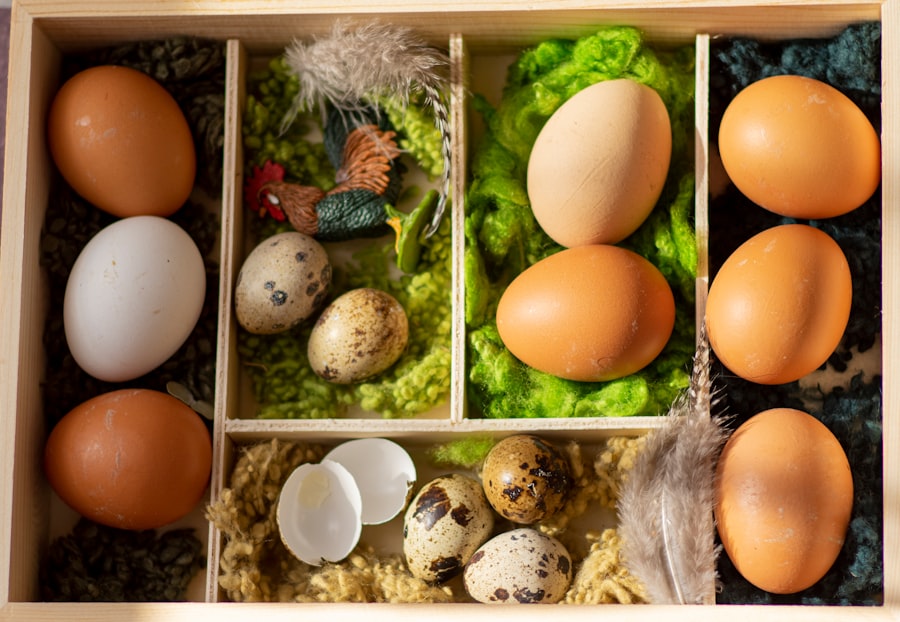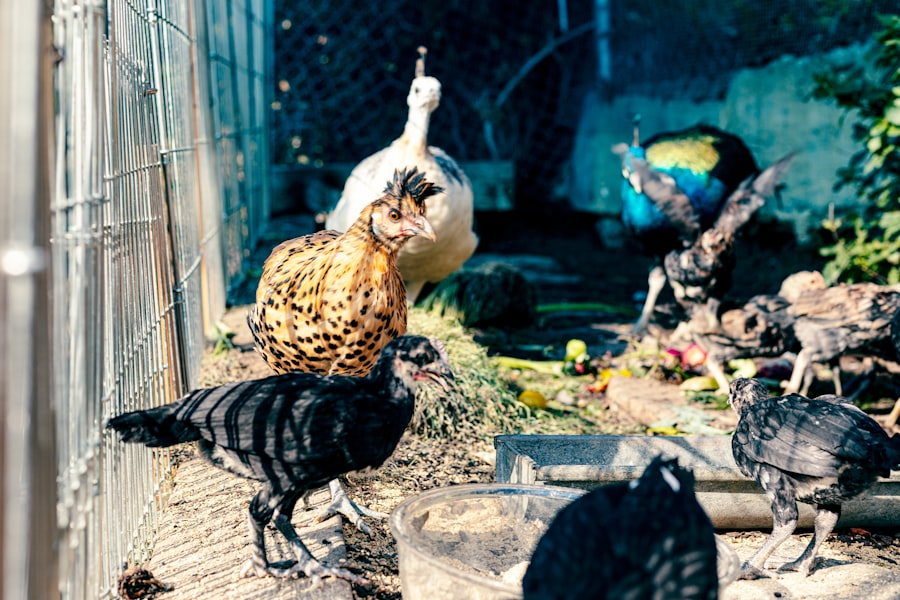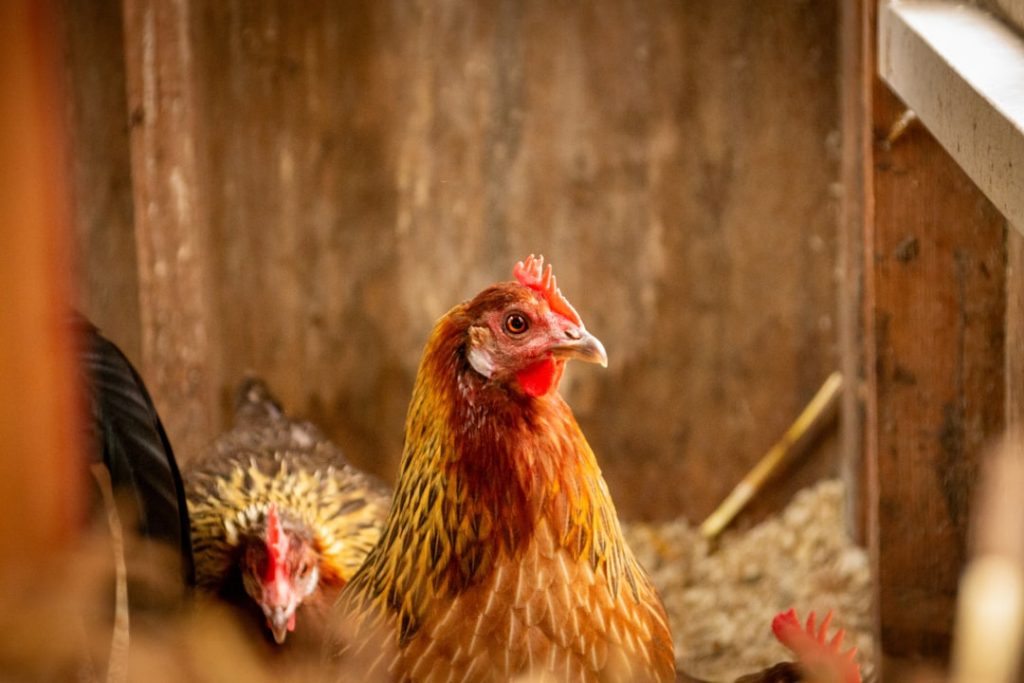Joint turning, also known as slipped tendon or twisted leg, is a common issue in baby chickens. This condition occurs when a chick’s leg becomes twisted or positioned abnormally. The causes of joint turning can be attributed to genetic factors, nutritional deficiencies, or environmental stressors.
Genetic factors, such as poor breeding practices or inherent abnormalities, can contribute to joint turning. Nutritional deficiencies, particularly in vitamins and minerals like vitamin D, calcium, and manganese, are also known to play a role in this condition. Environmental stressors, including overcrowding, improper bedding, or slippery surfaces, can increase the risk of joint turning in baby chickens.
Symptoms of joint turning include a noticeable limp, abnormal gait, or difficulty standing or walking properly. Early detection and intervention are crucial for addressing this issue and preventing further complications. Poultry farmers and backyard chicken enthusiasts should monitor their baby chickens closely for any signs of joint turning.
To prevent joint turning, it is important to maintain proper breeding practices, provide a balanced diet with adequate vitamins and minerals, and ensure a suitable environment for baby chickens. By understanding the causes and symptoms of joint turning, chicken keepers can take proactive measures to promote healthy joint development in their flock.
Table of Contents
- 1 Proper Nutrition for Healthy Joint Development
- 2 Creating a Safe and Comfortable Environment for Baby Chickens
- 3 Providing Adequate Space for Exercise and Movement
- 4 Monitoring and Managing the Health of Baby Chickens
- 5 Preventing Injury and Trauma in Baby Chickens
- 6 Consulting a Veterinarian for Professional Advice and Care
- 7 FAQs
- 7.1 What are the common causes of baby chickens turning out at the joint?
- 7.2 How can I prevent baby chickens from turning out at the joint?
- 7.3 What are the signs of baby chickens turning out at the joint?
- 7.4 Can baby chickens with turned out joints be treated?
- 7.5 Are there specific breeds of chickens that are more prone to turning out at the joint?
Key Takeaways
- Joint turning in baby chickens can lead to serious health issues and discomfort
- Proper nutrition is essential for healthy joint development in baby chickens
- Creating a safe and comfortable environment is crucial for preventing joint issues
- Adequate space for exercise and movement is important for joint health in baby chickens
- Regular monitoring and managing of the health of baby chickens is necessary for early detection of joint problems
- Preventing injury and trauma is key to maintaining healthy joints in baby chickens
- Consulting a veterinarian for professional advice and care is important for addressing any joint issues in baby chickens
Proper Nutrition for Healthy Joint Development
Nutritional Requirements for Healthy Joints
A diet specifically formulated for the nutritional needs of growing chicks should include adequate levels of protein, vitamins, and minerals to support bone and joint health. Protein is an essential nutrient for healthy joint development in baby chickens, and a high-quality chick starter feed should contain a sufficient amount of protein to support muscle and bone growth.
Key Nutrients for Joint Health
Vitamins and minerals such as vitamin D, calcium, and manganese are important for bone development and preventing joint abnormalities. Supplementing the diet with these essential nutrients can help promote healthy joint development and reduce the risk of joint turning in baby chickens.
Hydration and Overall Health
In addition to providing a well-balanced diet, it is important to ensure that baby chickens have access to clean water at all times. Proper hydration is essential for overall health and can help prevent dehydration, which can contribute to joint problems. By prioritizing proper nutrition and hydration, poultry farmers and backyard chicken enthusiasts can support healthy joint development in their baby chickens and reduce the risk of joint turning.
Creating a Safe and Comfortable Environment for Baby Chickens

Creating a safe and comfortable environment is essential for promoting the overall well-being of baby chickens. A clean and well-maintained brooder or coop provides a secure space for baby chickens to grow and develop without the risk of injury or stress. Proper bedding, adequate ventilation, and appropriate temperature control are important factors to consider when creating a safe environment for baby chickens.
Bedding material should be clean, dry, and non-slippery to prevent injuries and promote healthy joint development. Pine shavings or straw are commonly used bedding options that provide a comfortable and safe surface for baby chickens to walk on. Additionally, proper ventilation is important for maintaining air quality and preventing respiratory issues that can impact the overall health of baby chickens.
Temperature control is also crucial, as fluctuations in temperature can cause stress and affect the development of baby chickens. Providing a safe and comfortable environment for baby chickens also includes minimizing potential stressors such as loud noises, predators, or overcrowding. By creating a calm and secure space for baby chickens to thrive, poultry farmers and backyard chicken enthusiasts can help reduce the risk of joint turning and promote overall health and well-being in their flock.
Providing Adequate Space for Exercise and Movement
Providing adequate space for exercise and movement is important for promoting healthy joint development in baby chickens. Limited space can lead to overcrowding, which can cause stress and increase the risk of injury or joint problems. Allowing baby chickens to move freely and engage in natural behaviors like scratching, pecking, and dust bathing supports muscle development and overall physical health.
A spacious brooder or coop with ample room for baby chickens to move around freely is essential for promoting healthy joint development. Additionally, providing access to an outdoor run or free-range area allows baby chickens to explore their surroundings and engage in natural activities that support physical development. It is important to ensure that outdoor areas are secure from predators and provide protection from extreme weather conditions.
In addition to providing adequate space for exercise and movement, it is important to encourage physical activity through enrichment activities such as perches, ramps, and toys. These elements provide opportunities for baby chickens to exercise their muscles and joints while also stimulating their natural instincts. By prioritizing adequate space for exercise and movement, poultry farmers and backyard chicken enthusiasts can support healthy joint development in their flock.
Monitoring and Managing the Health of Baby Chickens
Monitoring and managing the health of baby chickens is essential for preventing and addressing potential issues such as joint turning. Regular health checks allow poultry farmers and backyard chicken enthusiasts to observe the overall condition of their flock and detect any signs of illness or injury early on. By staying vigilant and proactive in managing the health of baby chickens, potential issues can be addressed promptly before they escalate.
Regular observation of baby chickens’ behavior, posture, and movement can provide valuable insights into their overall health and well-being. Any changes in behavior or physical appearance should be noted and investigated further to ensure that any potential health concerns are addressed promptly. Additionally, maintaining accurate records of growth rates, feed consumption, and any observed abnormalities can help track the progress of baby chickens’ development.
In addition to regular observation, it is important to implement a proactive health management plan that includes vaccination schedules, parasite control measures, and access to veterinary care when needed. Preventive measures such as vaccination against common poultry diseases and regular deworming can help reduce the risk of health issues that may impact joint development. By monitoring and managing the health of baby chickens effectively, poultry farmers and backyard chicken enthusiasts can promote overall well-being and reduce the risk of joint turning in their flock.
Preventing Injury and Trauma in Baby Chickens

Creating a Safe Environment
One key aspect of preventing injury and trauma is ensuring that the brooder or coop is free from hazards that could cause harm to baby chickens. Sharp objects, protruding wires, or uneven surfaces should be removed or repaired to create a safe environment for baby chickens to move around without the risk of injury. Additionally, providing proper lighting and visibility can help reduce the likelihood of accidents that could lead to injury.
Handling with Care
Handling baby chickens with care is also important for preventing injury and trauma. Gentle handling techniques should be used when interacting with baby chickens to avoid causing stress or physical harm. Properly securing equipment such as feeders, waterers, and heating sources can also help prevent accidents that could lead to injury.
Gradual Introductions and Minimizing Stress
Furthermore, it is important to introduce new elements or changes in the environment gradually to minimize stress and reduce the risk of injury. Sudden changes in routine or environment can cause anxiety in baby chickens, potentially leading to accidents or trauma. By taking proactive measures to prevent injury and trauma, poultry farmers and backyard chicken enthusiasts can promote a safe and healthy environment for their flock.
Consulting a Veterinarian for Professional Advice and Care
Consulting a veterinarian for professional advice and care is essential for addressing any health concerns or issues related to joint turning in baby chickens. Veterinarians with experience in poultry health can provide valuable insights into the specific needs of baby chickens and offer guidance on preventive measures as well as treatment options if necessary. When observing signs of joint turning or any other health issues in baby chickens, seeking veterinary care promptly is crucial for addressing the problem effectively.
Veterinarians can conduct thorough examinations to diagnose the underlying cause of joint turning and recommend appropriate treatment options based on the specific needs of the affected chicks. In addition to addressing existing health concerns, veterinarians can provide valuable advice on preventive measures that promote healthy joint development in baby chickens. This may include recommendations on nutrition, environmental management, exercise routines, and overall health management practices that support musculoskeletal health.
Furthermore, veterinarians can offer guidance on vaccination schedules, parasite control measures, and other preventive healthcare practices that help reduce the risk of health issues impacting joint development in baby chickens. By consulting a veterinarian for professional advice and care, poultry farmers and backyard chicken enthusiasts can ensure that they are taking proactive measures to promote the overall health and well-being of their flock. In conclusion, promoting healthy joint development in baby chickens requires a comprehensive approach that addresses nutrition, environment, exercise, health management, injury prevention, and professional veterinary care.
By understanding the potential causes and symptoms of joint turning in baby chickens, poultry farmers and backyard chicken enthusiasts can take proactive measures to prevent this issue from occurring. Providing a well-balanced diet rich in essential nutrients, creating a safe environment with adequate space for exercise, monitoring health closely, preventing injury and trauma, and consulting a veterinarian for professional advice are all essential components of promoting healthy joint development in baby chickens. By prioritizing these aspects of care, poultry farmers and backyard chicken enthusiasts can support the overall well-being of their flock and reduce the risk of joint turning in their baby chickens.
If you’re looking for tips on how to keep baby chickens from turning out at the joint, you might want to check out this article on where to put your chicken coop. Proper placement of the coop can help prevent issues like this from occurring.
FAQs
What are the common causes of baby chickens turning out at the joint?
Common causes of baby chickens turning out at the joint include genetic factors, nutritional deficiencies, improper incubation conditions, and injuries.
How can I prevent baby chickens from turning out at the joint?
To prevent baby chickens from turning out at the joint, ensure that they are provided with a balanced diet, proper incubation conditions, and a clean and safe environment. Additionally, avoid breeding chickens with known genetic issues.
What are the signs of baby chickens turning out at the joint?
Signs of baby chickens turning out at the joint include difficulty walking, abnormal leg positioning, and visible deformities in the joints.
Can baby chickens with turned out joints be treated?
In some cases, baby chickens with turned out joints can be treated through supportive care, such as providing them with proper nutrition, supplements, and physical therapy. However, severe cases may require veterinary intervention.
Are there specific breeds of chickens that are more prone to turning out at the joint?
Certain breeds of chickens, particularly those bred for rapid growth, are more prone to turning out at the joint. It is important to be aware of the potential genetic predisposition of specific breeds when breeding or raising chickens.
Meet Walter, the feathered-friend fanatic of Florida! Nestled in the sunshine state, Walter struts through life with his feathered companions, clucking his way to happiness. With a coop that’s fancier than a five-star hotel, he’s the Don Juan of the chicken world. When he’s not teaching his hens to do the cha-cha, you’ll find him in a heated debate with his prized rooster, Sir Clucks-a-Lot. Walter’s poultry passion is no yolk; he’s the sunny-side-up guy you never knew you needed in your flock of friends!







